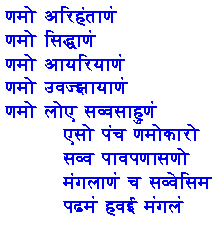His message of nonviolence (Ahimsa), truth (Satya), non-stealing (Achaurya), celibacy (Brahma-charya), and non-possession (Aparigraha) is full of universal compassion. He said that,
"A living body is not merely an integration of limbs and flesh but it is the abode of the soul which potentially has perfect perception(Anant-darshana), perfect knowledge (Anant-jnana), perfect power (Anant-virya), and perfect bliss (Anant-sukha)."
Mahavir's message reflects freedom and spiritual joy of the living being.
Mahavir was quite successful in eradicating from human intellect the conception of God as creator, protector, and destroyer. He also denounced the worship of gods and goddesses as a means of salvation. He taught the idea of supremacy of human life and stressed the importance of the positive attitude of life.
Lord Mahavir also preached the gospel of universal love, emphasizing that all living beings, irrespective of their size, shape, and form how spiritually developed or under-developed, are equal and we should love and respect them.
Jainism existed before Mahavir, and his teachings were based on those of his predecessors. Thus, unlike Buddha, Mahavir was more of a reformer and propagator of an existing religious order than the founder of a new faith. He followed the well established creed of his redecessor Tirthankara Parshvanath.
However, Mahavir did reorganize the philosophical tenets of Jainism to correspond to his times. Lord Mahavir preached five great vows while Lord Parshva preached four great vows.
In the matters of spiritual advancement, as envisioned by Mahavir, both men and women are on an equal footing.
The lure of renunciation and liberation attracted women as well. Many women followed Mahavir's path and renounced the world in search of ultimate happiness.
In a few centuries after Mahavir's nirvana, Jain religious order (Sangha) grew more and more complex. There were schisms on some minor points although they did not affect the original doctrines as preached by the Tirthankars. Later generations saw the introduction of ritualistic complexities which almost placed Mahavir and other Tirthankars on the throne of Hindu deities.
